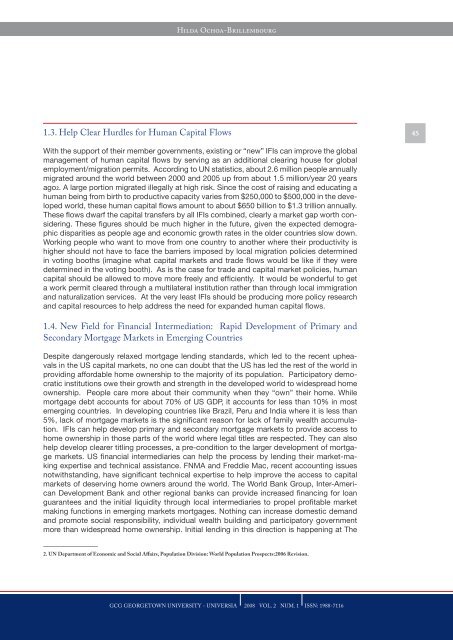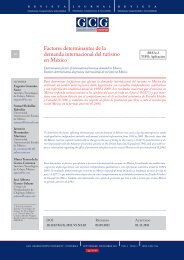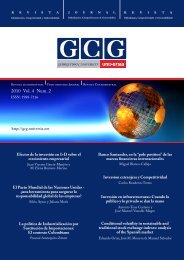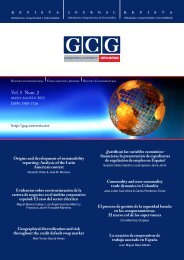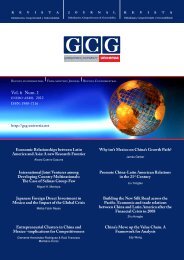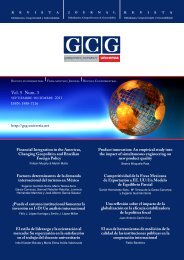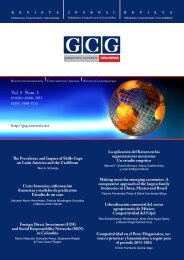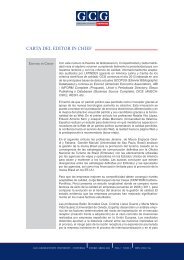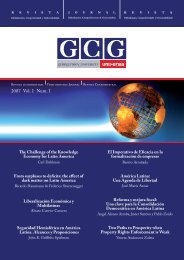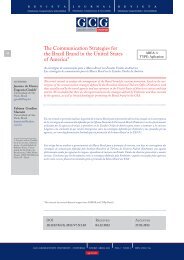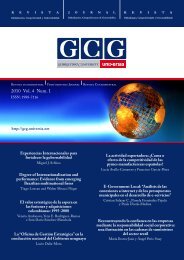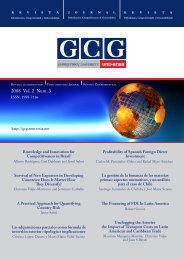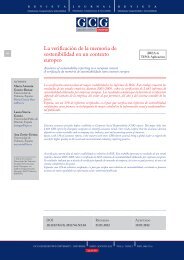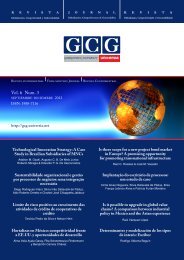2008 Vol. 2 Num. 1 - GCG: Revista de Globalización, Competitividad ...
2008 Vol. 2 Num. 1 - GCG: Revista de Globalización, Competitividad ...
2008 Vol. 2 Num. 1 - GCG: Revista de Globalización, Competitividad ...
You also want an ePaper? Increase the reach of your titles
YUMPU automatically turns print PDFs into web optimized ePapers that Google loves.
Hilda Ochoa-Brillembourg1.3. Help Clear Hurdles for Human Capital Flows45With the support of their member governments, existing or “new” IFIs can improve the globalmanagement of human capital flows by serving as an additional clearing house for globalemployment/migration permits. According to UN statistics, about 2.6 million people annuallymigrated around the world between 2000 and 2005 up from about 1.5 million/year 20 yearsago2. A large portion migrated illegally at high risk. Since the cost of raising and educating ahuman being from birth to productive capacity varies from $250,000 to $500,000 in the <strong>de</strong>velopedworld, these human capital flows amount to about $650 billion to $1.3 trillion annually.These flows dwarf the capital transfers by all IFIs combined, clearly a market gap worth consi<strong>de</strong>ring.These figures should be much higher in the future, given the expected <strong>de</strong>mographicdisparities as people age and economic growth rates in the ol<strong>de</strong>r countries slow down.Working people who want to move from one country to another where their productivity ishigher should not have to face the barriers imposed by local migration policies <strong>de</strong>terminedin voting booths (imagine what capital markets and tra<strong>de</strong> flows would be like if they were<strong>de</strong>termined in the voting booth). As is the case for tra<strong>de</strong> and capital market policies, humancapital should be allowed to move more freely and efficiently. It would be won<strong>de</strong>rful to geta work permit cleared through a multilateral institution rather than through local immigrationand naturalization services. At the very least IFIs should be producing more policy researchand capital resources to help address the need for expan<strong>de</strong>d human capital flows.1.4. New Field for Financial Intermediation: Rapid Development of Primary andSecondary Mortgage Markets in Emerging CountriesDespite dangerously relaxed mortgage lending standards, which led to the recent upheavalsin the US capital markets, no one can doubt that the US has led the rest of the world inproviding affordable home ownership to the majority of its population. Participatory <strong>de</strong>mocraticinstitutions owe their growth and strength in the <strong>de</strong>veloped world to wi<strong>de</strong>spread homeownership. People care more about their community when they “own” their home. Whilemortgage <strong>de</strong>bt accounts for about 70% of US GDP, it accounts for less than 10% in mostemerging countries. In <strong>de</strong>veloping countries like Brazil, Peru and India where it is less than5%, lack of mortgage markets is the significant reason for lack of family wealth accumulation.IFIs can help <strong>de</strong>velop primary and secondary mortgage markets to provi<strong>de</strong> access tohome ownership in those parts of the world where legal titles are respected. They can alsohelp <strong>de</strong>velop clearer titling processes, a pre-condition to the larger <strong>de</strong>velopment of mortgagemarkets. US financial intermediaries can help the process by lending their market-makingexpertise and technical assistance. FNMA and Freddie Mac, recent accounting issuesnotwithstanding, have significant technical expertise to help improve the access to capitalmarkets of <strong>de</strong>serving home owners around the world. The World Bank Group, Inter-AmericanDevelopment Bank and other regional banks can provi<strong>de</strong> increased financing for loanguarantees and the initial liquidity through local intermediaries to propel profitable marketmaking functions in emerging markets mortgages. Nothing can increase domestic <strong>de</strong>mandand promote social responsibility, individual wealth building and participatory governmentmore than wi<strong>de</strong>spread home ownership. Initial lending in this direction is happening at The2. UN Department of Economic and Social Affairs, Population Division: World Population Prospects:2006 Revision.<strong>GCG</strong> GEORGETOWN UNIVERSITY - UNIVERSIA <strong>2008</strong> VOL. 2 NUM. 1 ISSN: 1988-7116


